
|
| Hundreds attended the burial on Thursday. |
DEARBORN HEIGHTS — On Wednesday, family and friends of Jayzon Mosed gathered at the Verheyden Funeral Home in Detroit to attend the viewing for the 13-year-old who was killed in Yemen. Several hundred people attended his burial on Thursday.
Mosed’s uncle, Tarek Mosed, said his nephew died Sept. 19. Jayzon Mosed had spent almost two months in a coma at a Germen hospital in Yemen after he’d been shot in the head during an ambush in the country’s capital, Sanaa.
“He will never be forgotten,” Tarek Mosed said.
According to a report, 13 men surrounded a car and began opening fire while Jayzon Mosed was with family members. One of his uncles was killed in the attack. The teen was in Yemen vacationing with his family for the summer. His friends and family say he was full of life and loved sports, particularly Detroit-based teams.
Mosed attended Priest Elementary School in Detroit, as well as Canton Elementary and Star International Academy. He played football and was a quarterback. He also loved to travel.

|
| Jayzon Mosed. |
Tarek Mosed said his nephew would have been 14 on Nov. 7. The teen had been expected to return to Michigan last month. Efforts were made locally to bring attention to the situation and raise money to help the family pay for medical expenses. A fundraiser was held in August and people made donations online. The Facebook page “Shooting for Life” was created to bring updates on his condition.
Jayzon Mosed’s family turned to the offices of Senators Carl Levin and Debbie Stabenow and Congressmen John Dingell, asking them to urge the U.S. government to get a plane into Yemen and transfer Mosed to a hospital in the United Arab Emirates, so he could receive proper treatment.
Tarek Mosed said he didn’t receive responses from either of the senators or the congressman and that emails he sent to government agencies were ignored.
A friend of the family who didn’t want to be identified said the hospital in Yemen didn’t have adequate resources to treat Mosed. The teen’s mother traveled to Yemen to visit her son and stay by his side.
The family was told medical flights couldn’t leave the country because of the unrest and because of a designated no-fly zone. The family of the young man contacted the American-Arab Anti Discrimination Committee (ADC) after the U.S. embassy in Yemen rejected their pleas for help.
ADC urged the U.S. Embassy in Yemen and the State Department to make exceptions to the no-fly zone so Mosed could receive proper medical treatment. Approval for a warplane was subsequently authorized, but Mosed never left Yemen because the plan fell through.
ADC contacted the U.S. Department of State and the Department of Homeland Security (DHS) in an effort to secure the assistance needed.
Abed Ayoub, the legal director of the ADC said the group is disappointed with the U.S. government’s response to getting Mosed proper treatment.
“We are certainly upset about the way the U.S. Government handled this,” he said. “The embassy in Yemen failed the family in this. They did not take the necessary steps to ensure adequate medical treatment in a timely matter.”
Mosed’s chances of survival may have been greater had the U.S. Government acted more swiftly to get him out of Yemen.
“Through the whole process our claims were dismissed,” Ayoub said. “It was a severe blow to his chances of survival.”
ADC complained that despite the fact that Mosed was an American citizen, the U.S. embassy refused to provide him with the needed assistance.
“He is an amazing nephew any uncle or aunt can wish for, a loving grandchild that any grandparent would love to have, a caring neighbor that any neighbor would care to have,” a family member said while the teen was still in a coma. “He is an amazing student who is loved by his peers and teachers; a child to a loving mother and a son to a loving father.”
Tarek Mosed said he is disappointed in the Yemeni and U.S. governments’ responses to getting his nephew proper medical treatment.
He also said it was his nephew’s first time in Yemen and that the boy was enjoying his summer break. He said Congress was on recess when the requests to offer assistance to his nephew were made.
“The family was upset. We can’t describe the pain they are feeling,” Ayoub said. “We extend our condolences to the family.”






Leave a Reply